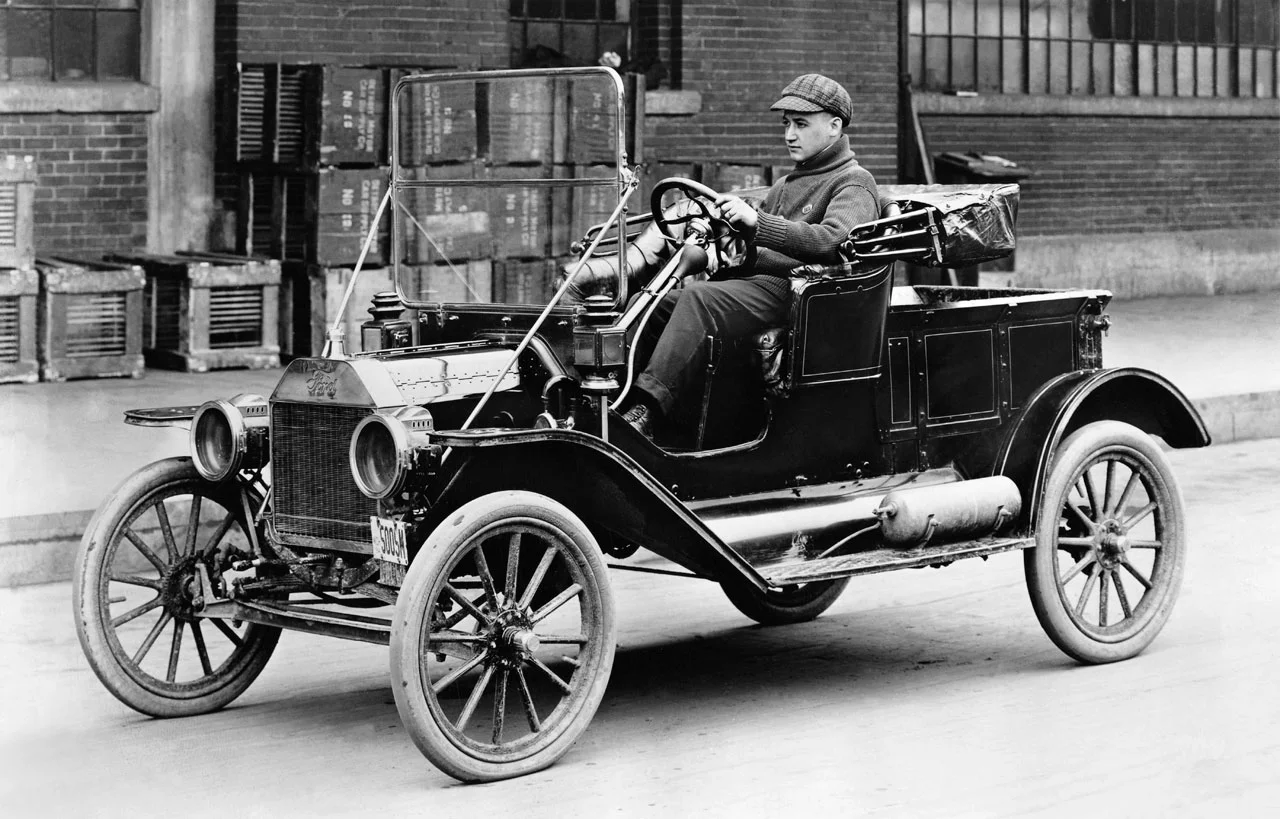While cultural and social change is ongoing, certain historic periods experience a burst of innovation that leaves much of the population gasping for breath. Why can't things stay the same? What is wrong with a good buggy whip and a horse that can average four miles per hour? How does a cell phone improve the need for concise limited conversation?
If you were born around 1860, your life became one of unimaginable and potentially threatening possibilities. The 1893 Chicago World's Fair was known as The White City because of the extensive use of electric street lights, an emerging phenomenon. By the early 1900s, most cities and many towns had outdoor and indoor electric lighting. What to do with all that leftover lamp oil? Would an electric short set your house on fire?
In 1899, Henry H. Bliss was the first person killed by a motor vehicle crash in the United States. Since then, mayhem on the roads has been an American tradition. To those born in the mid 1800s, the horseless carriage seemed more a belching dragon than the future of transportation.
For many, The first phonographs and telephones, while more than a parlor trick, , just added to the growing discord. Moving pictures, while opening up the world, were likely to corrupt the young with their lurid story lines. Overhead, men sundered the sky in flying machines. If God had wanted men to fly, they would have been born with wings.
By the time you were approaching your dotage, the radio had been introduced. True magic to make voices and music appear out of nowhere. You remember back to the days when cousin Mary plunked out a quiet tune on the piano and you read poetry by the soft light of a kerosene lamp. Old Ben, your reliable horse, was waiting to take you to the county fair. Wasn't that a balanced world where men and women could experience true harmony?
If you were born in the middle of the 20th century, as I was, future change could be just as exciting and disconcerting as it was to those born a hundred years earlier. Television killed the golden age of radio and the studio system for making movies. The growing lure of a little box with black and white figures gave us Howdy Doody but also stark documentaries about a potential nuclear holocaust.
In the sixties, the lone phone in my college dorm was at the end of the hall. It only worked when some drunk student hadn't pulverized it during a rowdy weekend. The phone was rotary dial; it was another twenty years before push button technology had become common. The Xerox machine came along in the 60s killing the carbon paper business and making my research essay on minor English poets much easier to duplicate.
The seventies brought about continued war protests, FM radio, and cassette players in cars. Finally we were free of having to listen to Cousin Clem on the radio, trying to sell us some used rust bucket at Auto Heaven. Instead, I could play "Stairway to Heaven" ten times in a row (not recommended).
The eighties were relatively benign, but introduced widely available cable TV, CDs, the VCR, which was impossible to program, and of course the microwave. I wasn't hot on buying a $300 baby bottle warmer for our first crumb cruncher, but once the deed was done, I became an acolyte. Pizza rolls for me, in two minutes, at three in the morning when the kid had colic made the situation bearable. Still, as my dad said of the microwave, "Devil's work! How can you cook without heat?"
The nineties was when all hell began to break loose: the first personal computers and early cell phones. Information overload had officially arrived. Buying our initial computer in the early nineties was a major family decision. Could I learn DOS? What if I hit the wrong key? Within a week my four year old was more advanced than me, and he has never looked back.
I waited two years before signing up for the internet with AOL because I didn't want to turn over my soul. It got sucked out anyway. Now, in the 21st century, we clutter our lives with a desktop, a laptop and a couple of tablets. Only ten seconds away from discovering the gross national product of Romania or reading War and Peace online.
The first cell phones were the size of phone booths, but soon you could fit the little sucker in the palm of your hand (before 7" smart phones). Initially you just made simple calls, but within a few years texting and internet access have made the phones many parents' worst nightmare. Their kids are driving while texting, surfing and yakking, a prescription for disaster until driverless cars become the norm. (Henry H. Bliss from 1899 meet Joshua Brown from 2016, the first person to die in a self-driving car accident). In the current era, smart phones will do your taxes, while you Skype mom in Hawaii, and order a 60" flat screen from Amazon. Nowhere to run, nowhere to hide.
I recall a lazy day in the early sixties. I have just finished watching a cartoon on one of the three black and white networks. Slow dialing a friend on a sturdy black phone, we decide to go to the library to check out books. As I walk to his house, I listen on my small transistor radio to top forty hits and hear John Kennedy say we are going to the Moon. The Moon! What can ever top that?

